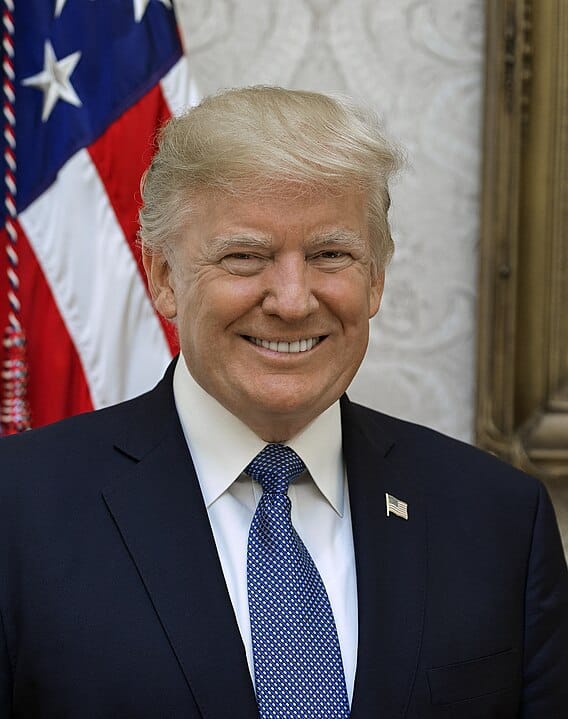Donald J. Trump (1946- ) was elected the 45th president of the United States in 2016 after one of the most unconventional and populist campaigns in U.S. history.
His one term in office was similarly unconventional. He was impeached twice, though not convicted, and faced numerous investigations and scandals. He regularly attacked individual journalists and the press in general for unfavorable news coverage, calling them the “enemy of the people” and removing from press events and rallies those he didn’t like.
Trump’s presidency also was notably marked by the COVID-19 pandemic which led to massive shutdowns and restrictions on Americans beginning in 2020 to stop the spread of the virus that eventually killed more than 1 million people in the United States.
During the pandemic, Trump sided with churches and religious liberty groups who opposed state regulations requiring them to abide by rules limiting gatherings. He issued guidance saying places of worship were “essential” and called on state governors to allow religious institutions to re-open.
The pandemic also featured largely in the 2020 election, which Trump lost to Joe Biden, and in Trump’s subsequent claims that the expansion of mail-in ballots because of the pandemic led to massive voting fraud. None of the claims were found to be true in the multiple state courts that reviewed them, but Trump refused to accept the election results. His attempts to stop the certification of the votes led to criminal charges that as, of this writing, are still being prosecuted.
One of Trump’s defenses in one of the criminal charges is that his speech to a crowd on Jan. 6, 2021, that preceded a mob attack on the U.S. Capitol was protected by the First Amendment and did not reach the bar of inciting others to illegal action.
During his speech, Trump, still the president, urged hundreds of supporters to "fight" to keep him in office by stopping the certification of votes then happening at the U.S. Capitol. Those in the crowd then proceeded to the Capitol where they broke down barriers and fought against guards to gain entry, temporarily stopping the certification as members of Congress fled to safety.
In a state criminal case in Georgia, Trump is accused of election interference and racketeering related to his actions to pressure state officials to change the results of Georgia’s vote counts, including through a recorded phone call to the Secretary of State.
Trump mastered Twitter to attack, belittle opponents
While the end of Trump’s presidency was a controversy unmatched by any preceding transfer of presidential power, so, too, was his road to election.
A New York City businessman, celebrity and reality TV star, Trump conducted his 2016 campaign by liberally using the social media platform Twitter to communicate directly with the public, unfiltered by his aides. His strong and stinging “tweets,” sometimes sent in the middle of the night, continued throughout his presidency.
During the Republican primaries, he hit hard at his challengers, insulting them with nicknames ("Little Marco" for Marco Rubio and "Lyin' Ted" for Ted Cruz). He similarly belittled the Democratic nominee, Hillary Clinton, calling her "Crooked Hillary" and accusing her of committing crimes by using a private web server for email when she was secretary of state. Later, he called Biden "Sleepy Joe" to emphasize his age and, in his new presidential campaign in 2023, called potential Republican primary opponent Ron DeSantis, "Ron DeSanctimonious."
Trump ran on a platform of reducing illegal immigration by building a wall on America’s southern border and promising to repeal the Affordable Care Act, also known as Obamacare. As president, he was successful in building parts of a border wall but was not successful in repealing the Affordable Care Act, which offers health insurance at lower prices based on income.
Trump also was far friendlier to Russian leader Vladimir Putin and other foreign strongmen than his predecessors, leading to questions about his handling of classified documents and Russia’s interference in the 2016 election though no wrongdoing by Trump was found.
Trump was combative during the presidential debates with moderators, in one case launching a sharp attack against moderator and then-Fox News reporter Megyn Kelly, beginning a confrontational tactic with journalists that would last throughout his presidency.
Trump and his press secretary often made claims that appeared to be palpably false. For example, after being elected, he said more people showed up to his inauguration than any previous president though photographs clearly suggested otherwise. Trump also claimed that the only reason that he lost the popular vote in 2016 (he clearly won the Electoral College) was because millions of immigrants illegally voted. No evidence substantiated this claim or similar fraudulent voting claims that he made about the 2020 election.
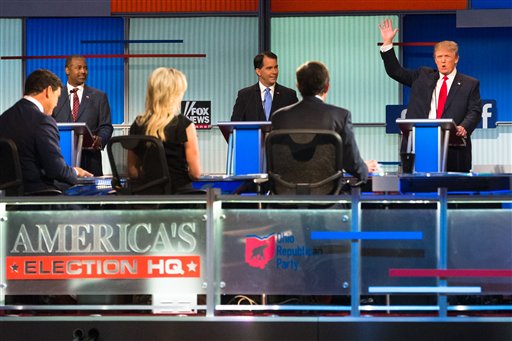
Trump was combative during the 2015 presidential debates, including with the moderators. In one case, he attacked moderator Megyn Kelly, who was then a Fox News reporter. (AP Photo/John Minchillo)
Trump called the press 'the enemy of the people'
It is doubtful that any national candidate since President Richard Nixon’s vice president, Spiro Agnew, has been more negative toward the established media than Trump.
He frequently called members of the media dishonest and singled them out for ridicule at his rallies. He called the press “the enemy of the people” and often bypassed the media by refusing to be interviewed. He instead preferred to reach his followers directly through tweets, many of which were outrageous but nonetheless captured public attention and news media coverage.
Trump initially hired a number of people from the alt-right movement, including Steve Bannon of Breitbart News, to be in his inner circle. He and his defenders often accused the established media of manufacturing “fake news.”
Trump was criticized by some for his attacks on the news media. Arizona Sen. Jeff Flake gave a speech on the Senate floor on Jan. 17, 2018, in which he said that Trump's characterization of the press as “the enemy of the people” echoed the words of Soviet dictator Joseph Stalin.
However, Trump continued to strike at the media. On July 25, 2018, White House officials Bill Shine and Sarah Sanders, barred CNN's Kaitlin Collins, that day’s pool reporter for all the networks, from a presidential event in the Rose Garden. Collins had shouted a question and apparently offended Trump as he was meeting with the president of the European Commission. Other members of the press, including Fox News that was usually friendly to Trump, protested the action against the reporter, which some associated with dictatorial regimes.
In January 2020, President Trump praised Secretary of State Mike Pompeo for doing “a good job” on National Public Radio (NPR) reporter Mary Louise Kelly after she reported that Pompeo shut down an interview with her. Pompeo had stopped the interview, then shouted and cursed at her after she had asked about his support for State Department personnel. Pompeo subsequently removed another NPR reporter from a list of reporters allowed on his flight to Eastern Europe, an action that the State Department Correspondents’ Association condemned.
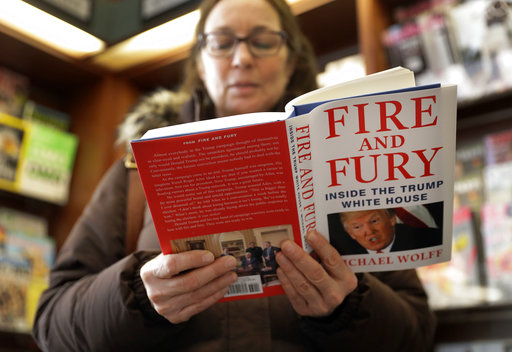
Trump has promised to “open up” libel laws after the publication of Michael Wolff’s highly critical book, Fire and Fury: Inside the Trump White House, was published in 2018.. The U.S. Supreme Court has said that libel laws must comport with First Amendment standards. In this photo, Kathy Mallin, from Illinois, looks over a copy of the book in Chicago. (AP Photo/Charles Rex Arbogast)
Trump promised to 'open up' libel laws, tried to repress critical book
During his presidency, Trump promised to “open up” libel laws, making it easier to win defamation claims against the press, and to punish individuals who burned the American flag — neither of which he did. (Both involve First Amendment freedoms: The Supreme Court has ruled that truth is a defense to a defamation claim and has set a higher showing of “actual malice” for public officials to prevail in a libel suit; it also has ruled that flag-burning is an expressive activity protected under the First Amendment.)
Trump himself has mounted a defense under the First Amendment for defamatory comments made about a women who he sexually assaulted and has threatened others who would publish negative information about him.
In 2023, Trump lost a libel claim by E. Jean Carroll for comments he made about her after she revealed that he sexually assaulted her during an encounter in Manhattan department store dressing room. He called her a "whack job" who he had never met and continually said her claims were made up. Carroll said Trump's continuing attack on her in his public appearances and in his social media posts spurred harassment by Trump supporters. A jury found Caroll's allegations of sexual assault to be true and later ordered Trump to pay $83.3 million in damages, which included $69 million in punitive damages, for his defamatory comments.
On the other end, after excerpts from Michael Wolff’s highly critical book, "Fire and Fury: Inside the Trump White House," was released in January 2018, Trump’s attorneys sent an 11-page letter to Wolff and to his publisher, Henry Holt & Co., asking them to “cease and desist from any further publication, release or dissemination of the book, the article, or any excerpts or summaries of either of them, to any person or entity, and that you issue a full and complete retraction and apology to my client as to all statements made about him in the book and article that lack competent evidentiary support.”
Wolff and his publisher, undoubtedly thankful for the additional publicity, instead expedited publication of the book, which became a bestseller. The Authors Guild issued a statement saying that “[i]t is one thing for a private citizen to use libel laws to quash speech. It is unheard of for a sitting President to do so."
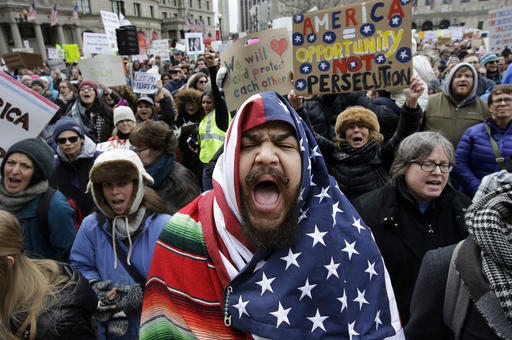
Trump issued two orders banning immigration from certain countries, all with Muslim majorities. While a circuit court ruled that the ban improperly discriminated on the basis of religion, the Supreme Court upheld the President’s broad authority to impose restrictions on immigrants from foreign countries. In this photo, Izzy Berdan of Boston chants slogans with other demonstrators during a rally against Trump’s travel bans in 2017. (AP Photo/Steven Senne)
Trump sought religious freedom, but was bashed for Muslim country ban
Early in his campaign, Trump was endorsed by Jerry Falwell Jr., president of Liberty University. Many evangelicals believed he would secure their First Amendment free exercise rights and exempt them from government regulations, such as the requirement that health plans provide access to birth-control pills that they consider to be abortifacients.
Indeed, as president, Trump signed an executive order seeking protections for religious freedom and appointed conservative judges to the Supreme Court who went on to rule in favor of religious liberty.
Still, some criticized Trump of religious discrimination when he issued two orders banning immigration from a select number of countries, all with Muslim majorities. While the 4th U.S. Circuit Court of Appeals ruled that the law improperly discriminated on the basis of religion in International Refugee Assistance Project v. Trump (2017), largely using Trump’s own campaign statements and tweets as evidence of what the court considered to be the order’s discriminatory purpose, the Supreme Court, in a separate case, Trump v. Hawaii, 585 U.S. ____ (2018), upheld the president’s broad authority to impose restrictions on immigrants from foreign countries when he thought they posed special security dangers.
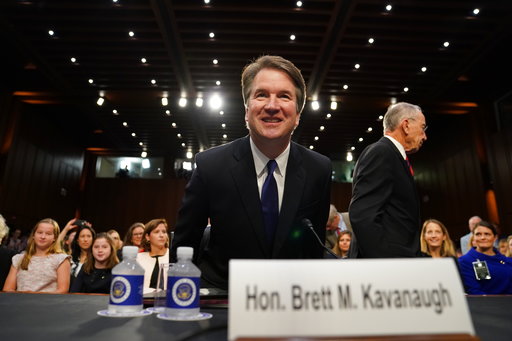
Brett Kavanaugh was one of three judges that Trump added to the Supreme Court. In this 2018 photo, Kavanaugh arrives at the Senate Judiciary Committee to begin his confirmation hearing. (AP Photo/Andrew Harnik)
Trump added 3 to Supreme Court
One of Trump's more lasting successes, and one praised particularly by Christian conservatives who had been concerned about the high court's rulings on abortion and gay rights, was the appointment of three conservative judges to the Supreme Court. The were:
- Neil Gorsuch, replacing conservative justice Antonin Scalia who died;
- Brett Kavanaugh, replacing Anthony Kennedy, often a decisive swing vote in close cases, who retired; and
- Amy Coney Barrett, who was nominated after the death of Ruth Bader Ginsburg who was generally considered to have more liberal views and who had taken a strong approach to separation of church and state.
Indeed, with the new justices in place, the high court overturned Roe v. Wade, allowing states to regulate and bar abortions, which many have since done. In a case involving First Amendment free speech and religious rights (303 Creative LLC v. Elenis), the new court put limits on state anti-discrimination laws, saying that a wedding website creator did not have to serve a gay couple because it would have forced her to provide expressive speech services that went against her religious convictions.
Trump investigated during his presidency
While Trump faced four criminal indictments after he left the presidency, he also fought accusations of inappropriate or illegal behavior throughout his years in office.
One of the first investigations involved possible ties between Trump and Russia during Trump's presidential campaign in 2016. Attorney General William Barr claimed that an investigation by special counsel Robert Mueller, which on many points was inconclusive, had exonerated Trump. Trump called the whole affair a “witch hunt.” The investigation, however, resulted in a number of pleas and indictments of members of the Trump team, as well as of Russian foreign agents.
In 2018, Trump’s former attorney, Michael Cohen, pleaded guilty to breaking campaign finance laws related to a payment to a former Playboy model — a case that later led to business fraud charges against Trump after he left office. The payment was designed to keep a story about an alleged affair between her and Trump out of the news during Trump’s 2016 presidential campaign. Cohen released a tape of a conversation with Trump that indicated that Trump was aware of plans to make a payment.
Trump’s first impeachment in 2019 involved Ukrainian aid
When it was revealed that Trump had engaged in a phone conversation with Ukrainian President Volodymyr Zelensky in which he appeared to condition military aid to that nation unless it launched in an investigation into Joe Biden's son who had received a salary as a board member of a Ukrainian energy company, the House in late 2019 impeached him on a party-line vote for abuse of power and failure to cooperate with congressional investigators.
The Republican-controlled Senate acquitted him.
2020 election takes place during COVID-19 epidemic
Not long after the impeachment and acquittal, the COVID-19 pandemic captured the attention of the nation and, indeed, the world.
The virus, which originated in China, began taking an increasing number of lives. Trump downplayed the deaths, claiming that the virus would disappear. He refused to wear face masks and did not insist that supporters do so at his campaign rallies even after he was briefly hospitalized with the disease.
Largely as a result of the pandemic, many states liberalized voting so that more people could cast mail-in ballots in the upcoming election rather than physically go to a polling place. Trump charged that this would lead to voting fraud.
Trump refused to concede the election when Biden was announced as winner and launched a series of unsuccessful lawsuits in states where he lost, questioning the electoral results and calling for recounts. Trump continued to question electoral counts, even in states like Georgia, Pennsylvania and Wisconsin where Republican state officials affirmed that they were accurate. Trump’s call to the Republican Secretary of State of Georgia urging him to "find" sufficient votes for him to carry that state is part of the Georgia criminal case now pending against him.
Capitol attack on Jan. 6, 2021, sought to stop Biden win
As the time came for Vice President Mike Pence to open the Electoral College votes before a joint session of Congress on Jan. 6, 2021, Trump held out hope that Pence could, contrary to all historical precedent, convert this ministerial act into a discretionary one and declare him the winner. As Pence indicated that he would not do so, Trump supporters gathered for a rally at the White House. Trump and his allies urged the crowd to continue to fight and to go to the Capitol Building. Trump told them that if they did not do so, they might not have a country left.
Trump did not intervene after the mob broke through the barricades and into congressional offices, threatening to hang the vice president. Five people, including a police officer, died in the riot.
In an extraordinary move, Twitter suspended Trump’s account “due to the risk of further incitement of violence” by the president. Despite criticism, this action did not violate the First Amendment because the site is not owned or maintained by the government.
Trump’s second impeachment was for inciting insurrection
The House impeached Trump a second time, this one for inciting an insurrection at the Capitol Building. House Speaker Nancy Pelosi delayed sending the indictment to the Senate until after Biden and Harris were inaugurated. Again, Trump broke with tradition in refusing to attend the inauguration although his vice president and former presidents George W. Bush and Barack Obama did so.
When the House delivered its indictment to the U.S. Senate, a majority of Republicans claimed that the Senate had no right to try an ex-president. If a two-thirds majority of the Senate had decided to convict Trump, they could have excluded him by majority vote from holding future governmental offices. However, the Senate again acquitted Trump in February 2021, after he had left office. Trump is now a presidential candidate in the 2024 election.
After leaving office, Trump indicted on 91 criminal charges
Nearly three years after leaving office, Trump was indicted in four separate cases involving 91 criminal charges.
The most serious are federal conspiracy and obstruction charges that allege illegal actions by Trump to overturn the 2020 election. Another relates to classified documents Trump took with him to his home when he left the presidency and how he handled those documents. The third, brought by a Manhattan attorney, relates to business fraud in how he classified hush money payments to an ex-porn star during the 2016 campaign as legal rather than campaign expenses. And the fourth are racketeering charges in Georgia related to his efforts to pressure state officials to change the vote counts so that he would win the state instead of Biden.
Trump challenges gag orders as limiting his free speech rights
Trump has remained an active participant in his court cases, often giving statements, observations and what some would describe as veiled threats outside the courtroom.
In two of cases against Trump — the election interference case brought by the U.S. Justice Department and the civil fraud case in state court in New York –– judges have issued gag orders to limit his comments outside the courtroom, particularly comments that could intimidate potential witnesses. In the election interference case, U.S. v. Trump, the U.S. Court of Appeals in the District of Columbia upheld most of the gag order after weighing competing claims of a need for the fair administration of justice and Trump's free speech rights.
One of Trump’s defenses in the criminal cases is that he is immune from criminal prosecution for acts he took as president. As the cases wind their way through the court system, it’s possible the Supreme Court will be called upon to consider this issue as well.
Finally, in a separate case in December 2023, the Colorado Supreme Court ruled that Donald Trump could be removed from the upcoming Republican presidential primary ballot under the U.S. Constitution’s insurrection clause. A lower court found that Trump’s actions and speech incited the violence at the U.S. Capitol on Jan. 6, 2021. (Speech that incites violence is not protected speech under the First Amendment.) The Supreme Court has agreed to hear the Colorado case and a corresponding Maine case to determine whether a state can remove someone from the ballot under the insurrection clause.
The author of this article is John Vile, a professor of political science and dean of the Honors College at Middle Tennessee State University. Deborah Fisher, director of the John Seigenthaler Chair in First Amendment Studies at MTSU, last updated Jan 18, 2024.

